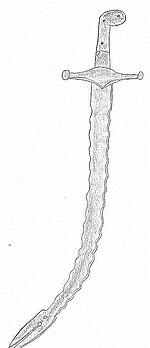Dsulfiquar Shamshir
| Dsulfiquar Shamshir | |
|---|---|

|
|
| Information | |
| Weapon type: | saber |
| Designations: | Shamshir, Dsulfiquar-Shamshir |
| Use: | weapon |
| Region of origin / author: |
Persia |
| Distribution: | Persia |
| Blade length: | about 74 cm |
| Handle: | Wood, horn, ivory |
| Lists on the subject | |
The Dsulfiquar Shamshir is a Persian saber .
description
The Dsulfiquar Shamshir has a narrow, curved and flamed, double-edged blade. The blade runs from the handle , only narrowing slightly to the place . The place is shaped into two points. The handle is shaped like the conventional shamshir . The parry is, as is customary in Arab Shamshiren, cruciform. The handle scales are generally made of wood or horn, but can also be made of ivory . The entire blade is engraved with floral decorations. In the case of weapons as described here, the name refers to the local shape of the blades. The Dsulfaquar Shamshir was used in Persia.
origin
A sword from Muhammad , the Dsulfiquar ( Arabic ذو الفقار, DMG Dhū l-Fiqār or also Zulfiqar, Zolfaqar, Dsulfikar, Dsulfakar) is called. Muhammad's nephew and son-in-law ʿAlī ibn Abī Tālib fought with him in various battles. Mohammed himself is said to have said when he saw Ali fighting: "There is no hero like Ali and no sword like Dsulfaquar", Arabic: لا فتى إلا علي لا سيف إلا ذو الفقار. There are different types of swords that were worked on the model of the Dsulfiquar. It is not known exactly what the real Dsulfiquar looked like as it has not been preserved.
Individual evidence
literature
- Lord Egerton of Tatton, Wilbraham Egerton Egerton, Indian and Oriental Armor , Courier Dover Publications, 2002, illustrated edition, pages: 133, 176, 174, ISBN 978-0-486-42229-9